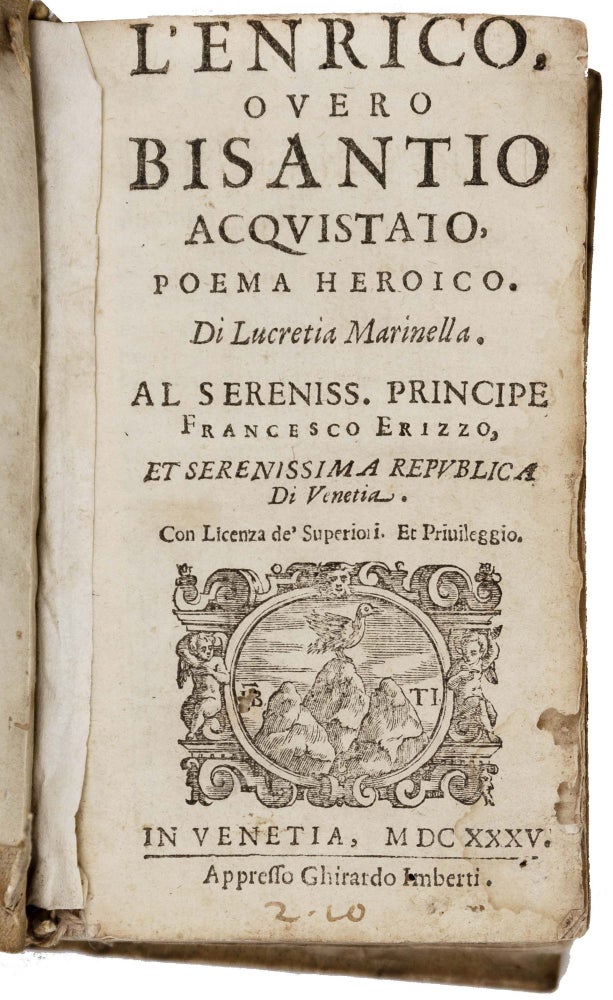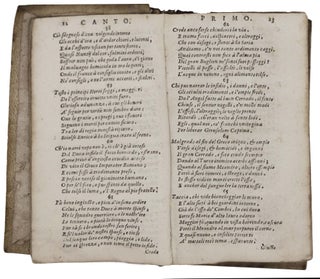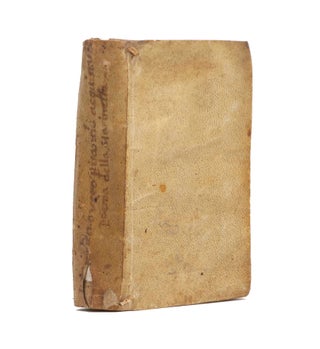L’Enrico overo Bisantio Acquistato poema heroico.
12mo (14 x 8 cm): 647, [3] pp. Bound in speckled stiff board parchment. Title inked on spine. Without pastedowns. Some foxing and worm holes throughout. Water stains and soiling on the first 40 pages. Overall, good. The first edition of a twenty-seven-canto epic poem on the Fourth Crusade (1202-1204) and Venice's conquest of Byzantium by Lucrezia Marinella (1571-1653), a prolific seventeenth-century Venetian writer, philosopher, and advocate of women's rights. The poem has been called an "incisive pro-woman (or proto-feminist) text," marked by female characters "whose behavior goes beyond accepted roles in her time" (Stampino, p. 65). First published in 1635, the poem was republished 1844 and 1845. In 2005, the first critical English edition appeared. In the seventeenth century, the epic was regarded as the highest genre. Only five epic poems written by women between 1560 and 1650 are known. Each of the twenty-seven cantos of L'Enrico contains a variable number of eight-line stanzas in ottava rima. Focusing on Venice's conquest of Byzantium, the poem features main historical characters, as well as several imaginary ones, including the female warrior Claudia, who possesses "a generous and great heart" and scorns that "a man could command to her" (quoted in Allen, Salvatore, p. 10). A daughter of the humanist scholar and physician Giovanni Marinello (who also wrote on women's diseases and cosmetics), Lucrezia Marinella had a relatively late marriage, which may have allowed her to focus on her studies. Her most famous work is La nobiltà e l'eccellenza delle donne co'diffetti et mancamenti de gli huomini (The Nobility and Excellence of Women and the Defects and Vices of Men), (1600), "a landmark at the European level from a philosophical and a sociological point of view for it exemplifies a keen understanding of the social forces that kept women in low esteem and dire dependency on men" (Allen, Salvatore, p. 8). Marinella intended her book as a response to the profoundly misogynistic Donneschi difetti (The Defects of Women) by Giuseppe Passi. Having appeared five years earlier, Passi's book is an example of a particularly violent chauvinistic culture, which flourished in Italy during the Counter-Reformation. In La nobiltà, "Marinella provides a cogent, extended argument for the superiority of women’s intellectual and moral capacities, effectively constructing an account of a nature proper to women and distinct from the nature of man" (Plato.Stanford). Marinella belonged to a movement of Venetian women writers, which also included Moderata Fonte, Arcangela Tarabotti, and Sara Copia Sullam. *Allen, Salvatore, "Lucrezia Marinelli and Woman's Identity in Late Italian Renaissance," in Renaissance and Reformation / Renaissance et Réforme 16/4 (Fall 1992), pp. 5-39; Marinella and Stampino, tr., Enrico; Or, Byzantium Conquered. A Heroic Poem (2005); https://plato.stanford.edu/entries/lucrezia-marinella/.
Sold



